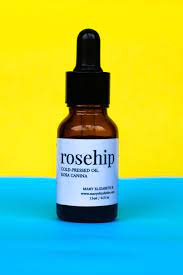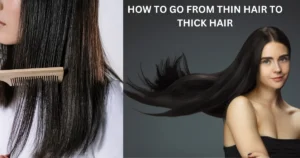Is Rosehip Oil Good for Hair?
Rosehip oil, which is made from the seeds of wild rose bushes, is well known for its beneficial effects on the skin. However, its potential as a potion for hair care is still largely unrealized. Rosehip oil shows potential in supporting healthy, lustrous hair thanks to its potent combination of vitamins, antioxidants, and vital fatty acids. Is rosehip oil good for hair? is an intriguing topic that is explored in this article. Let’s learn how to maximize its potential for healthy, vivacious locks.
 Understanding Rosehip Oil
Understanding Rosehip Oil
Rosehip oil, extracted from the seeds of the wild rose plant (Rosa canina), is rich in essential fatty acids, antioxidants, and vitamins. These components contribute to its potential as a versatile hair care solution.
Nutrient Powerhouse: Vitamins and Fatty Acids
Rosehip oil boasts a high content of vitamins A, C, and E, along with omega-3 and omega-6 fatty acids. These nutrients are crucial for maintaining hair health, as they provide the nourishment your hair needs to thrive.
You may also like..The Ultimate Guide to Hair Care:10 Best DIY Hair Masks
Top 10 Benefits of Rosehip oil
1.Nourishes and Hydrates: Rosehip oil is rich in essential fatty acids that deeply nourish and hydrate the hair, leaving it softer and more manageable.
2.Stimulates Hair Growth: The vitamins and antioxidants in rosehip oil promote a healthy scalp environment, which can lead to improved hair growth over time.
3.Strengthens Hair Strands: The nutrients in rosehip oil help strengthen hair from within, reducing breakage and split ends.
4.Tames Frizz: The lightweight texture of rosehip oil allows it to effectively control frizz, making your hair smoother and more polished.
5.Enhances Natural Shine: Regular use of rosehip oil can bring out the natural shine of your hair, leaving it looking lustrous and vibrant.
6.Soothes Scalp Irritation: The anti-inflammatory properties of rosehip oil can help soothe an irritated scalp, reducing redness and itchiness.
7.Prevents Dandruff: By maintaining scalp health, rosehip oil can minimize dandruff and flakiness, promoting a healthier scalp environment.
8.Protects from Environmental Damage: Rosehip oil’s antioxidants provide a protective barrier against environmental pollutants and UV rays, safeguarding your hair from damage.
9.Improves Elasticity: The fatty acids in rosehip oil can improve the elasticity of your hair, making it more resilient to styling and environmental stressors.
10.Adds Silkiness and Softness: Regular application of rosehip oil can leave your hair feeling silky and soft to the touch, enhancing its overall texture and feel.
Rosehip oil as Part of Your Hair Care Routine
To reap the benefits of rosehip oil, consider using it as a pre-shampoo treatment or mixing a few drops into your conditioner. This integration can amplify the effects and leave your hair feeling softer and more manageable.
Choosing the Right Rosehip Oil Product
Not all rosehip oil products are created equal. Opt for cold-pressed, organic, and pure rosehip oil to ensure you’re getting the maximum benefits without any harmful additives.
Application Techniques for Maximum Benefits
Apply rosehip oil gently by warming a few drops between your palms and then distributing it evenly through damp hair. Focus on the ends and work your way up to avoid making your scalp greasy.
Potential Side Effects
While rosehip oil offers numerous benefits for hair care, it’s important to be aware of potential side effects:
1.Allergic Reactions: Some individuals may be sensitive to rosehip oil, leading to allergic reactions such as redness, itching, or a rash. It’s advisable to conduct a patch test before applying it to your hair.
2.Greasy Appearance: Using excessive amounts of rosehip oil can make your hair appear greasy or oily. Use it sparingly and focus on the hair ends rather than the scalp to avoid this effect.
3.Weighted Hair: Overusing rosehip oil can weigh down fine hair, making it look flat and lifeless. Opt for a lightweight application to prevent this.
4.Interference with Styling: Applying too much oil may interfere with styling, as it can make your hair harder to manage and style as desired.
5.Unwanted Buildup: In some cases, using rosehip oil too frequently without proper cleansing can lead to product buildup on the scalp and hair.
Conclusion
Incorporating rosehip oil into your hair care routine can be a game-changer. With its nutrient-rich composition and numerous benefits, rosehip oil has the potential to transform dull and lifeless locks into a vibrant and healthy mane. Remember, consistency is key when using natural remedies, so give rosehip oil some time to work its magic.
Disclaimer-The information in this article is meant to serve as general knowledge only and is not meant to be a replacement for expert medical or hair care advice. Before making significant changes to your regimen, it is advised to conduct a patch test and consult a healthcare or hair care specialist because individual sensitivities to rosehip oil can vary.
Recommended-What Causes White Hair at Early age? 20 Best Natural Remedies What Does Leave-in Conditioner Do?5 Best Benefits
FAQs
While rosehip oil can provide nourishment and shine to your hair, it's not a direct replacement for a regular conditioner. It's best used as a supplement to your hair care routine, either by mixing a few drops into your conditioner or applying it before shampooing.
Yes, rosehip oil is generally suitable for all hair types, including dry, damaged, and frizzy hair. Its lightweight texture allows it to be easily absorbed without leaving a greasy residue.
The frequency of use depends on your hair's needs and your routine. You can start by using rosehip oil 1-2 times a week as a pre-shampoo treatment or mixing a few drops into your conditioner.
While rosehip oil has nutrients that can support scalp health and hair growth, it's not a cure for baldness. It can help create a healthier environment for hair growth, but for more severe hair loss issues, it's advisable to consult a dermatologist.Can rosehip oil replace my regular conditioner?
Is rosehip oil suitable for all hair types?
How often should I use rosehip oil on my hair?
Can rosehip oil cure baldness?


 Understanding Rosehip Oil
Understanding Rosehip Oil

